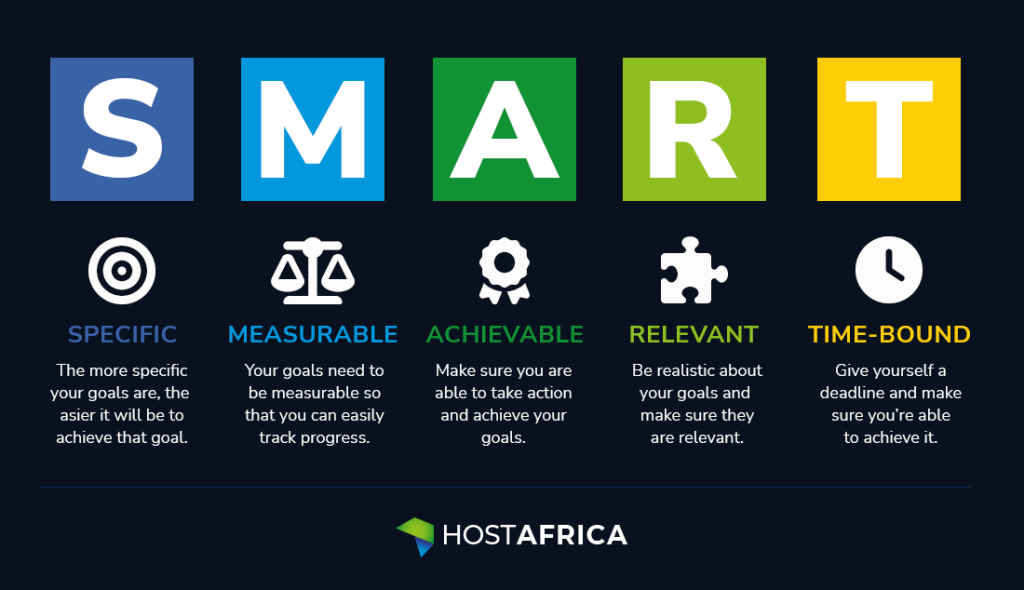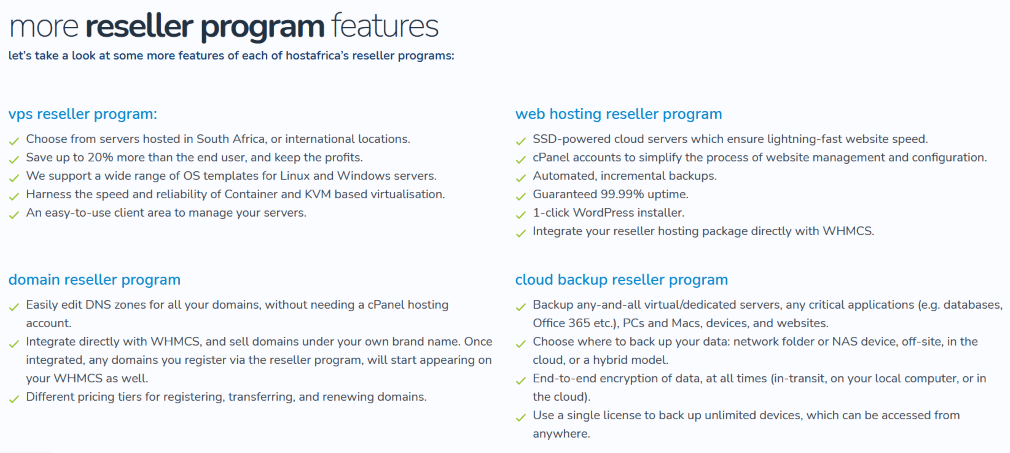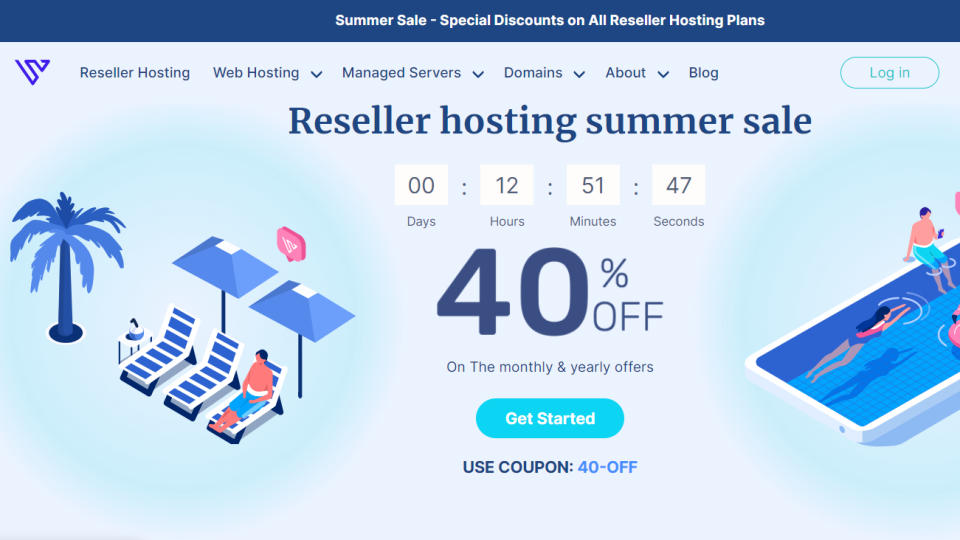
By this time, if you’ve read some of our previous posts, you have a broad overview of how to set up a hosting reseller business. So, you might have the technical details and know some of the things you should consider when setting up a business.
But apart from this, you also want to know how to make money with your business. Fortunately, we’re here to help and in this post, we’ll delve into the nuts and bolts of marketing your business and selling hosting packages to your customers.
A short recap
Before looking at these aspects in more detail, let’s do a short recap first. As mentioned, we’ve written about some of the things you need to know about reselling hosting. In that post, we delved a bit deeper into:
- What reselling is and how it works.
- How you can become a hosting reseller.
- The skills you’ll need.
An important point we made in the post is that, as a hosting reseller, you don’t merely act as a middleman and take your share of the markup. We emphasised that you need real skills to become a successful reseller. To recap all these aspects, don’t hesitate to read that post again.
Another aspect we touched on briefly in the post relates to the process of becoming a hosting reseller. Now that we’ve recapped, let’s expand on the process and deal with the business side of things. Simply put, and leaving the technical details aside for a moment, we want to show you how you can make money with reseller hosting.
The steps you’ll follow to make money with reseller hosting
Remember, as a hosting reseller, you’ll need to focus on generating sustainable recurring income in the form of monthly subscriptions rather than making one-off sales. This requires a unique approach to your offering, marketing, and customer service.
With that in mind, let’s look at the steps you’ll need to follow to generate a sustainable income as a reseller. Keep in mind, though, that these steps are not set in stone and the steps you’ll follow will depend on your unique goals and objectives.
Set goals for yourself
Although many business owners focus on actionable strategies like developing marketing plans and creating sales tactics, they often forget one of the most important aspects of becoming successful – goal setting. So, this will be the first step in the process. You’ll set goals for your business.
These goals serve two significant purposes. For one, it gives you something to aim for. It’s much easier aiming at a target you can see than shooting into the dark, right?
Their other purpose is to give you something you can track your progress against. And if you’re able to track your progress, you’ll gauge your performance. So, if your progress is better than you expected, well done. If not, you can implement the measures necessary to improve.
Now the question is: How do you set these goals? It’s always better to set SMART goals. In other words, you should set goals that are Specific, Measurable, Achievable, Relevant, and Time-Bound. A perfect example of a SMART goal would be, for instance, that you want 100 paying customers by the end of 2022.
Once you’ve set these goals, you’ll know what needs to be done to achieve them and, in a way, will shape the remainder of the steps you’ll follow.
Find your niche
The next step is to find your niche. It’s here where you’ll decide what segment of the market your business and products will serve. Why choose a niche? Well, choosing a niche allows you to narrow down your market and focus on serving an under-served part of it. In turn, this sets you up for more sales.
The best way to explain it might be by using a simple example. Let’s say you start a reseller business, and you serve the market as a whole. Sure, this gives you a larger customer base, but there’s also more competition. And oftentimes, the competition will include the big players in the market with large marketing budgets and huge customer service teams. A budget you don’t have.
Increase your chances of success by offering products specifically aimed at your niche to capitalise on under-served market segments and reduce the competition.
In contrast, when you niche down and focus on a specific segment of the market, you can offer products specifically aimed at that segment, reduce the competition, and, in the process, increase your chances of success. Now, that sounds a lot better, doesn’t it?
How do you find your niche? This involves doing market research to find a specific segment where you can provide a unique offering and offer value with your products.

Know your customers
Once you’ve found your niche, the next step would be to know your customers. And here, it’s not only about who they are. You need to understand their specific needs, requirements, and demands. You need to understand where to find them, what they’re willing to pay, and how you’ll market your services to them. Simply put, you need to know everything there is to know about your customers.
To gain this understanding, you’ll once again need to do market research. Here, it could be helpful to look at the reviews for other hosting providers. Here, you’ll learn what customers want and expect, what aspects of a product or service they like, and what aspects they don’t.
Don’t forget your competitors
Understanding only your customers is not enough, though. Although you’ve found a niche, narrow as it might be, you’ll always have competitors. So, you also need to know and understand everything about your competitors.
To do this, you’ll study the websites of competitors serving your specific niche. Here are some specific things you need to consider when doing so:
- What they offer. Look at the hosting packages they provide, what features they offer, and what add-ons they have available.
- Their pricing. Consider how much they charge for their hosting packages and how much they charge for any extra services or add-ons.
- How they market their offerings. Finally, look at how your competitors market their products to their customers.

Ultimately, the goal of understanding your competition is not only to tailor your offering to be competitive, but also to develop the strategies necessary to make you stand out from the crowd.
Get your market positioning right
It’s here where your understanding of both your customers and your competition comes together. Based on your research, you’ll need to decide on the ideal ways to serve the market, your customers, and the best way to stand out from the crowd.
For example, you might decide to offer a premium product. Of course, this involves providing more features and value. But it could also involve larger hosting providers with more resources and higher budgets, so it could be challenging to complete.
Likewise, you might decide to offer more bare-bones packages with fewer features. This, in turn, means that, while marketing could be easier, revenue and profits might also be lower.
Ultimately, finding the right market positioning is a balancing act that requires weighing up all the different options to find the one where you’ll stand out in the market and set yourself up for success. Understandably, this will also depend on your specific niche and the customers you want to serve.
Define your offering
Based on your customers’ needs and expectations and your positioning in the market, you’ll need to define the products and services you’ll offer to your customers. As mentioned earlier, you could offer a premium offering that provides more value, services, and features, a low-cost option, or you could offer anything in between.

Ultimately, to generate sustainable recurring income, you should align your offering to what your customers want and what they’ll pay for.
Find the right hosting provider
Now that you’ve defined where you want to position your business in the market, it’s time to find the right hosting provider. Here, based on the packages and products you would like to offer to your customers, you’ll need to find a hosting provider that aligns with these requirements.
When looking for the right hosting provider, you’ll obviously want to find one where you’ll optimise your profits. However, it’s imperative that you look past price alone. You should also consider what extra services and features they provide and whether their support is up to scratch. Simply put, you’ll need to consider the value they offer.
Ultimately, it’s all the hosting provider’s features combined that determine how well you’ll be able to serve your customers. As we mentioned in our previous post, our reselling packages not only set you up to make a handsome profit, but we also provide stellar support, the option to change your hosting package as your business grows, and many other features that provide value.
Get your branding on point
The next step in the process is to develop your business’s branding. And when it comes to branding, it’s about more than creating a logo, picking colours, and choosing a font for your website. Your branding is how all these aspects work together to portray who you are, what you do, and how you serve your customers.
As such, your branding should communicate your business’s mission, values, and what you want to achieve. The goal is that anyone who sees your branding should immediately know what you stand for and the quality of service you provide.
Launch your reseller business
Once you’re done with the steps mentioned above, you’re ready to launch your business. By this time, you’ll know who your customers and competitors are, what products and services you’ll offer, and how much you’ll charge.
So, to launch your business, you’ll typically only need your website and email address. Your website will be the primary way in which you’ll get your products in front of customers, and email the main way for you to communicate with them to answer any questions and solve issues.
Fortunately, when it comes to setting up your website, there are tons of options available. You can do it yourself, hire a freelancer to do it for you, or even use one of the many website builders available on the market today. With email, the position is no different as there are many providers available.
Ideally, you should host your website and email with the hosting provider you use for your business. When you do, you’ll know how their service and packages work and try out the product you sell for yourself.
Market your reseller business
Once your reseller is up and running, you can offer the best packages, services, and pricing that serve your niche, but you’ll hardly attract any customers if they don’t know about your business. So, you need to market your business effectively if you want to generate sustainable revenue.
You have to understand, though, that when it comes to marketing, handing out flyers at the nearest traffic light is no longer good enough. No, you have to take a fully integrated approach to marketing that involves several strategies, tactics, and methods.
As such, your marketing approach will typically involve at least:
Your website
Your website is the first touch-point your customers will have with your business and, as such, is an important component of your marketing strategy. It needs to be clean, modern, and easy to navigate to enhance the user experience. More importantly, you should ensure that you use the right SEO keywords in any content you post on your website, whether it’s your sales pages or blog content. This will enable your customers to find you through search engines.
Despite newer marketing platforms and tools being available, email is still one of the most effective marketing techniques you can use to market your business and generate awareness about your brand. In fact, of all the marketing tools and strategies available, email has the highest return on investment. Remember, though, that when using email for marketing, you should focus on providing relevant and valuable content that will be helpful for your audience instead of sending sales content.
Social media
Nowadays, social media is a very effective tool in any marketer’s toolbox. A major benefit of using social media for marketing is that it allows you to interact and engage with your customers and give them the opportunity to get to know your business on a more personal level. As a result, it enables you to build relationships with your customers, which leads to more trust and loyalty. When using social media, however, the same considerations, applicable to email, apply. As such, you should focus on distributing relevant, valuable, and helpful content.
Paid ads
Paid ads, in contrast to email, blog posts, and social media, give you the opportunity to distribute direct sales and marketing content. Here, you’ll typically pay for PPC ads, which means you’ll pay a small fee every time a customer clicks on your ad, which then takes them to your website.
Keep in mind that these are just some ways you can market your business, and there are many others you can use based on your target audience and as your business grows. For example, you could consider video marketing, more intricate email marketing campaigns, and setting up sales funnels that guide your customers through every step of the buying journey.
Offer stellar customer experiences
Think about this for a moment. If a customer is faced with a choice between five different products that are all similarly priced and offer comparative features, which will they choose? More often than not, they’ll select the product where they’ll get the best customer experience.

For this reason, it’s crucial that you offer stellar customer experiences. This involves implementing the tools and measures necessary to answer your customers’ questions and solve their problems from the moment they land on your website, to providing excellent support after they’ve become paying customers. This could involve anything from live chat to chat bots and social media messaging.
When you’re able to do this, you’ll not only serve your customers better, but also turn them into some of your biggest promoters. And this might be the most effective form of marketing you can use.
Use data to your advantage
Finally, once your business is up and running, and you’re marketing your products effectively, it’s vital that you consistently measure your performance. Fortunately, while running your business, you’ll generate vast amounts of data to help you do this.
For example, this data will show you:
- How many people visit your website and what they do while there.
- How many people engage with your social media posts.
- Whether mail recipients open your emails.
- Your conversion rate on your website, email, and social media.
- Which marketing strategies perform the best.
- Which products sell more.
Google Analytics is an excellent tool for this, and it’s free.

Keep in mind that these are just a small sample of the metrics you can measure and track, and there might be others that could be of value, depending on your business. More importantly, this data and these metrics won’t have any value if you don’t analyse them.
In other words, you should analyse the data to get deeper insights into where your business is performing well and where your business and marketing processes might need some work. Based on these insights, you can then implement the strategies to improve.
Wrapping up
There you go, now you’ve seen what, apart from the technical process, goes into setting up and running a reseller hosting business. As you can see, it takes a fair amount of work, but the payoff can be significant if you do your groundwork right.
https://www.hostafrica.ke/blog/reseller/make-money-reseller-hosting/






